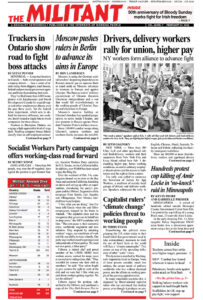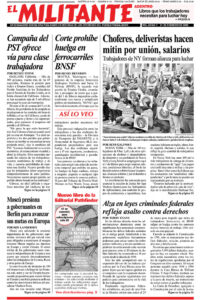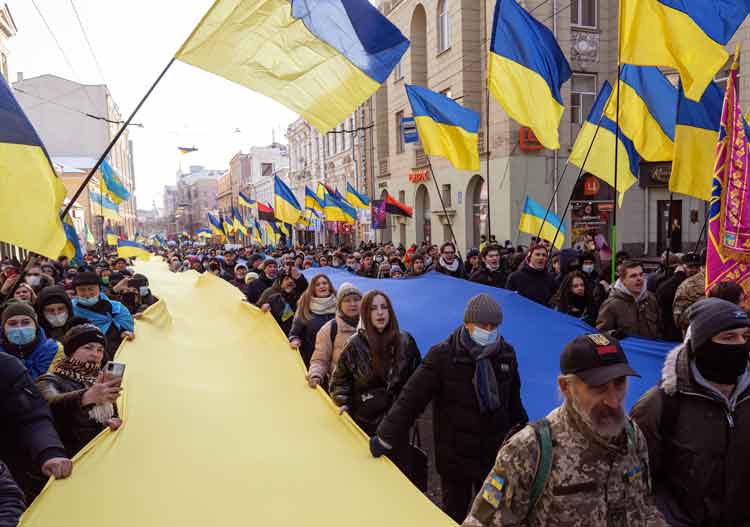Moscow is using the German capitalist rulers’ deepening dependence on Russian natural gas to squeeze them to stand aside as Moscow advances its interests in Europe and against Ukraine. The Russian rulers’ military encirclement of Ukraine threatens Ukrainian independence and a war that would fall overwhelmingly on the working people of Ukraine, Russia and elsewhere in Europe.
Moscow’s massive buildup on Ukraine’s borders has sparked preparations to resist inside Ukraine, and also protests in Russia against President Vladimir Putin’s military moves.
Some 130,000 combat troops along Ukraine’s eastern, northern and southern flanks increase the possibility of war. Even without an all-out invasion, Moscow may be emboldened to seize Ukrainian territory or launch attacks aimed at bolstering pro-Russian separatists fighting the government in eastern parts of the country.
The Kremlin demands that Washington promise to never admit Ukraine into its NATO military alliance and to remove NATO forces from Eastern Europe.
“It is in the interests of workers and farmers, here and around the world, to demand ‘Russia hands off Ukraine!’ and to back the fight by Ukrainian working people to defend their independence against Moscow’s threats,” Joel Britton, Socialist Workers Party 2022 candidate for governor of California, told a rally kicking off its ballot drive Feb. 5. “We also say the U.S. rulers are no friend of the Ukrainian people. The working class needs its own foreign policy, to join alongside fellow workers worldwide. We call for U.S. and NATO forces out of Eastern Europe.”
Moscow seeks domination
Putin’s moves are aimed at exploiting weaknesses and divisions among the imperialist powers in Europe, and especially to draw the German rulers closer to Moscow’s orbit.
He also seeks to reclaim Moscow’s control over Eastern European countries, formerly dominated by the Soviet Union before its disintegration in 1991. To justify Moscow’s threats, Putin claims Russians and Ukrainians are “one people.”
Putin gained support from Chinese President Xi Jinping when they met in Beijing Feb. 4. Both regimes seek to expand their reach at the expense of Washington, while keeping a close eye on each other at the same time. They issued a joint statement demanding Washington provide “security guarantees” against “the further enlargement of NATO” in Eastern Europe and condemning the U.S. rulers’ military links with the Australian government.
President Joseph Biden seeks to protect Washington’s imperialist interests by sending additional U.S. troops to augment the tens of thousands already stationed across Europe. But the U.S. rulers have no plans to send NATO forces into Ukraine. Instead, the White House threatens Moscow with “severe sanctions” if Russian troops move against Kyiv.
Washington and Berlin are “in lockstep,” Biden claimed after meeting German Chancellor Olaf Scholz in the U.S. capital Feb. 7. But the only thing they’re in “lockstep” on is refusal to send troops to Ukraine. Otherwise, their conflicting interests take priority. And there is little agreement on a course of action among the 27 competing capitalist governments in the European Union.
That same day French President Emmanuel Macron held talks in Moscow and later in Kyiv looking to make French capital a bigger player in the region. He briefed Putin on his plans for establishing a Europe-wide military alliance independent of NATO.
Over 5,000 people protested Feb. 5 with banners saying “Kharkiv is Ukraine” and “Stop Russian aggression.” Kharkiv, near the Russian border, is Ukraine’s second-largest city. Many of its residents are Russian-speakers.
“I was born in Crimea. That’s enough, they’ve already taken a homeland from me,” Iryna Gayeva told Agence France-Presse at the protest. “I live here, my parents are from Russia, but I don’t want to see any occupiers.”
In Kyiv and other cities in Ukraine, thousands of civilian volunteers are training alongside military reservists to resist any Russian invasion.
In 2014 a monthslong popular uprising in Kyiv’s Maidan Square spread across the country as hundreds of thousands mobilized to topple the hated pro-Moscow president.
When Moscow responded by seizing the Crimean Peninsula from Ukraine, and Moscow-backed separatist fighters seized parts of the Donbas in the east of the country, 50,000 people came out to protest in Moscow. Since then Putin has moved systematically to silence or imprison his political opponents.
Despite this, a Jan. 30 open letter from the Russian Congress of Intellectuals condemned the “party of war” in the Russian leadership. It is gaining thousands of signatures online.
The Russian people are “hostages of a reckless adventurism that has come to typify Russia’s foreign policy,” it says. The signatories pledge to build “a mass anti-war movement in Russia” if a war takes place.


